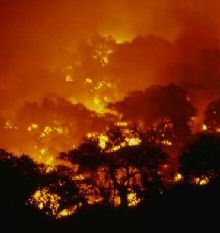16 February 2009
Dire new warning on climate from IPCC scientist
by Kate Melville
 Previously unconsidered positive feedbacks in the climate system (such as the release of arctic permafrost) have led a Nobel Prize-winning Intergovernmental Panel on Climate Change (IPCC) scientist to warn that "as a society we are facing a climate crisis that is larger and harder to deal with than any of us thought."
Previously unconsidered positive feedbacks in the climate system (such as the release of arctic permafrost) have led a Nobel Prize-winning Intergovernmental Panel on Climate Change (IPCC) scientist to warn that "as a society we are facing a climate crisis that is larger and harder to deal with than any of us thought."
"Greenhouse gases in the atmosphere are rising more rapidly than expected, increasing the danger that without aggressive action to reduce emissions the climate system could cross a critical threshold by the end of the century," says Chris Field, director of the Carnegie Institution's Department of Global Ecology and co-chair of the IPCC Working Group 2. Field is overseeing the Working Group 2 Report on the predicted impacts of climate change for the IPCC Fifth assessment, scheduled to be published in 2014.
"The data now show that greenhouse gas emissions are accelerating much faster than we thought," says Field. "Over the last decade developing countries such as China and India have increased their electric power generation by burning more coal. Economies in the developing world are becoming more, not less carbon-intensive. We are definitely in unexplored terrain with the trajectory of climate change, in the region with forcing, and very likely impacts, much worse than predicted in the fourth assessment."
Perhaps more worryingly, new studies are revealing potentially dangerous feedbacks in the climate system that could convert current carbon sinks into carbon sources. Field points to tropical forests as a prime example. Vast amounts of carbon are stored in the vegetation of moist tropical forests, which are resistant to wildfires because of their wetness. But warming temperatures and shifting rainfall patterns threaten to dry the forests, making them less fireproof. Researchers estimate that loss of forests through wildfires and other causes during the next century could boost atmospheric concentration of CO2 by up to 100 parts per million (ppm) over the current 386 ppm, with possibly devastating consequences for global climate.
At the same time, warming in the Arctic is expected to speed up the decay of plant matter that has been in cold storage in permafrost for thousands of years. "There is about 1,000 billion tons of carbon in these soils," says Field. "When you consider that the total amount of carbon released from fossil fuels since the beginning of the Industrial Revolution is around 350 billion tons, the implications for global climate are staggering."
"The [previously published] IPCC fourth assessment didn't consider either the tundra-thawing or tropical forest feedbacks in detail because they weren't yet well understood," he says. "But new studies are now available, so we should be able to assess a wider range of factors and possible climate outcomes. One thing that seems to be certain, however, is that as a society we are facing a climate crisis that is larger and harder to deal with than any of us thought. The sooner we take decisive action, the better our chances."
Related:
Did human-induced climate change begin thousands of years ago?
New DOE program aims to predict abrupt climate change
CO2 Emissions In China Rocketing
CO2 Rocketing, Carbon Sinks Failing
Carbon Sink Sunk
Pleistocene Era Methane Gatecrashes Greenhouse Gig
Source: Carnegie Institution
